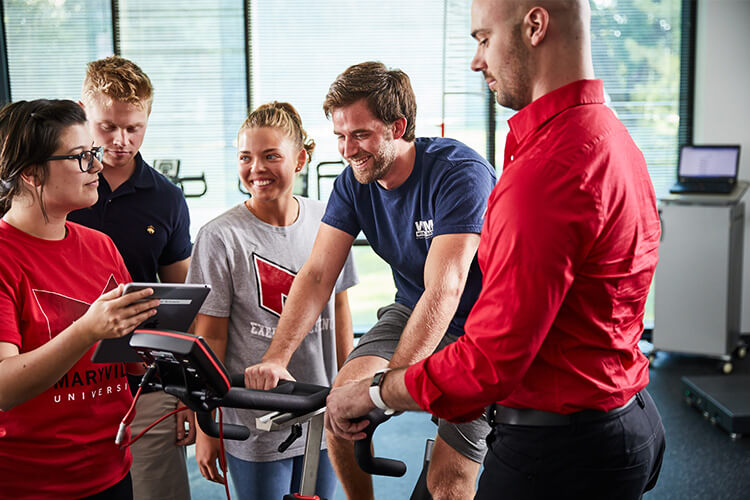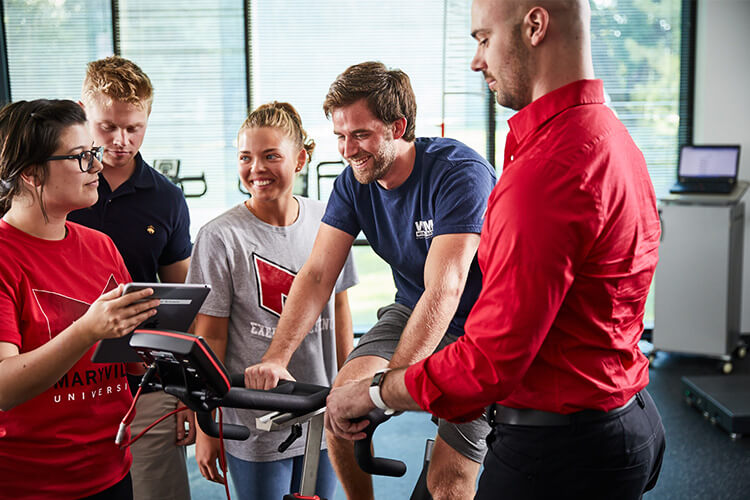NSCA Exam Prep Tips

As a growing number of people realize the benefits of physical fitness, such as increased energy, improved heart health, and improved sleep quality, the exercise science industry is expanding at an astonishing rate. Employment of athletic coaches is projected to grow 20% between 2021 and 2031, much faster than the average growth of all occupations combined, according to the U.S. Bureau of Labor Statistics. Employment of athletic trainers is projected to grow 17% over the same period, also much faster than average.

Students interested in pursuing a career in athletics should look into the benefits of higher education in exercise science and NSCA certification. In addition to improving students’ postgraduation job prospects, certification demonstrates that an individual possesses advanced knowledge and expertise in the field.
Below are tips that students can use to prepare for an NSCA exam, as well as information on how Maryville University helps its students gain NSCA certification.
What Is the NSCA?
The National Strength and Conditioning Association (NSCA) is a nonprofit organization that was founded in 1978 with the purpose of advancing sports science, and strength and conditioning professions. In addition to offering various certifications, the NSCA provides networking opportunities, research journals, continuing education coursework, and career development services for its members.
As of late 2022, the organization had more than 60,000 members around the globe, including personal trainers, educators, performance and sport scientists, researchers, and tactical professionals.
Choosing the Right NSCA Certification to Meet Your Career Goals
Three of the most common NSCA certifications are Certified Strength and Conditioning Specialist (CSCS), Certified Personal Trainer (NSCA-CPT), and Tactical Strength and Conditioning Facilitator (TSAC-F). Although each certification is tailored to a specific career path, in some instances, professionals may benefit from becoming certified in more than one area.
- Certified Strength and Conditioning Specialist: CSCS certification is designed for individuals interested in using research-backed strategies to train and condition athletes and teams. This certification is designed for individuals looking to apply scientific knowledge to help athletes reach peak performance.
- Certified Personal Trainer: NSCA-CPT certification is ideal for professionals who want to help athletes improve their athletic performance while reducing their likelihood of injury. This is a leading certificate for current and aspiring personal trainers.
- Tactical Strength and Conditioning Facilitator: TSAC-F certification is ideal for professionals who are interested in working with the military, first responders, and law enforcement professionals to increase their readiness by improving their strength and endurance. This certification is ideal for individuals who want to train people to meet the unique challenges of working in tactical environments.
Exam Prerequisites for the Three Types of NSCA Certifications
The prerequisites to sit for these certification exams are as follows:
Certified Strength and Conditioning Specialist
The primary prerequisites for CSCS candidates include holding a bachelor’s degree or higher from an accredited institution or being enrolled as a college senior at an accredited institution. Professionals with terminal degrees in physical therapy or chiropractic medicine may also apply. Candidates need to also hold CPR/AED certification. Those who aren’t yet CPR/AED certified can sit for the CSCS exam, but CSCS certification won’t be granted until valid CPR/AED credentials are submitted to the NSCA. Candidates have one year from their exam date to submit this documentation or their exam results become invalid.
Certified Personal Trainer
Students interested in sitting for the NSCA-CPT exam must have a high school diploma (or equivalent), be at least 18 years old, and have a current CPR/AED certification. Similar to CSCS candidates, individuals who don’t have a current CPR/AED certification can still sit for the NSCA-CPT exam; however, certification won’t be granted until all eligibility requirements have been met. Upon passage of the exam, candidates have up to one year to submit their CPR/AED credentials to the NSCA.
Tactical Strength and Conditioning Facilitator
The prerequisites for the TSAC-F exam are identical to the prerequisites for the NSCA-CPT exam. In addition to being at least 18 years old, candidates must have a high school diploma or equivalent and have a current CPR/AED certification.
Preparing for the NSCA Exam
Coursework within Maryville University’s online BS in Exercise Science program has been designed to help students prepare for each of these three NSCA exams.
Because Maryville is an NSCA Education Recognition Program school, prep work for NSCA exams happens throughout Maryville’s online BS in Exercise Science curriculum, with a focus on the CSCS exam. The program’s experienced faculty members include NSCA exam prep educators. Some courses use NSCA textbooks, and students have access to quizzes directly from the publisher and a final exam practice text. Additionally, in March of each year, Maryville hosts an official NSCA Exam Prep Live Clinic on campus, the NSCA’s premier resource to help students prepare for the exam.
Other exam prep tips include the following:
- Obtain NSCA study materials. Students interested in taking each exam can obtain exam study materials directly from the NSCA website. The cost for study materials varies based on the package that students choose to purchase.
- Create a study plan. Students should ensure that they provide themselves with enough time to prepare for their exam. The NSCA says that candidates with both an exercise science degree and practical experience, such as internship hours, should plan for three to six weeks of study time, whereas college students without practical experience should plan to study for three to six months.
- Optimize the study space: Students should ensure that their study space is free from distractions. For example, they should silence their phone ringer and turn off social media notifications.
- Take practice exams. Several websites offer free online NSCA practice exams. Both short practice quizzes and full-length practice tests are available.
Get Ready for Exam Day
Students can prepare for exam day in various ways, such as ensuring that they get a good night’s sleep and eating a healthy meal before taking the test. They can also make sure that they’ve received the proper instruction and materials to prepare for the exam.
Are you ready to make a brave move toward your career in exercise science? Learn more about how Maryville’s online BS in Exercise Science degree program can prepare you with the knowledge and skills needed to become an NSCA-certified sports science professional.
Recommended Readings
The Future of Virtual Health Coaching
Types of Coaching Styles for Athletes
Maryville Online Bachelor’s in Exercise Science — Program Overview
Sources:
National Strength and Conditioning Association, Become a NSCA-Certified Personal Trainer (NSCA-CPT)
RunRepeat, Fitness Industry Statistics 2021-2028 (Market Research)

